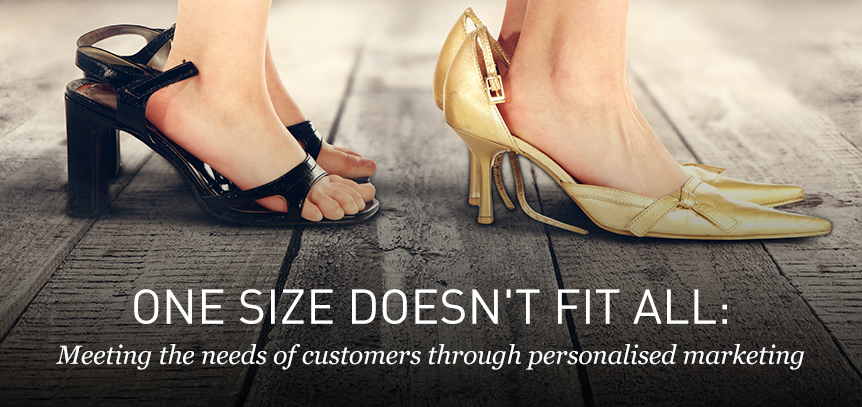
One size doesn’t fit all: meeting the needs of customers through personalised marketing
Seeing customers as an individual – focusing on the customer journey. Making customers matter; delivering relevant content

Have you heard the term ‘consumerisation of B2B’? Not the snappiest name, we admit but it’s already having a profound effect on B2B marketers and how they engage their target audience.
In short, it means that our business customers are starting to act more like consumers. The way they buy for work is changing. Before they would have bought from catalogues or asked a sales rep to visit. Now they research and buy more online using an array of mobile devices that they take with them wherever they go. And crucially, they expect to be treated as an individual whether they are a consumer or a business customer.
Of course, B2B customers are still likely to have complex needs and a longer buying process. But personalisation and relevant content to engage our target audience is more important than ever. The techniques used to interact with consumers as individuals are increasingly being used with B2B decision makers. In fact, Gartner predicts that 70% of B2B websites will offer personalised features for customers by 2018.
To stand out from the huge amount of choice our buyers have, personalisation will become a key differentiator for B2B in the next year. The internet has broken down geographical barriers and allowed more visibility of pricing so the digital customer experience needs to be compelling enough to:
1. Increase engagement
Learning about your customers’ interests and intentions means that you can provide more relevant content that is likely to keep them on your site for longer, giving you a better chance of developing a deeper connection with them. According to research by Evergage and Researchscape both B2B and B2C marketers using personalisation saw a 40% increase in time spent on their site.
2. Increase conversion
Providing personalised content at the right point in the buying process will provide more sales opportunities. The same research found that personalisation delivered a 58% uplift in conversion. Netflix is the ultimate example of how to make this work in the consumer world.
3. Help with customer loyalty and retention
Personalised marketing allows you to make give your customer experience the personal touch and show your customers that you know and appreciate them. It also allows you to cross-sell or upsell products in the same way as Amazon does with its recommendations and suggestions.
4. Create long-lasting brand awareness
Even if your buyer is not ready to buy yet, personalised content can create the awareness that makes them come back later. Potential B2B buyers who feel strongly connected to your brand are 60% more likely to consider purchasing from you (according to research by CEB/Google).
5. Give you competitive advantage
The explosion of web, social and mobile means that customers are likely to find similar products in multiple locations. Making your marketing personalised gives you the opportunity to move away from competing on price or product features and compete on customer experience instead.
6. Communicate efficiently
With the right data about your customers’ needs and intent, you can make your marketing communications work harder for you with genuinely useful content and personalised calls to action using your customers’ preferred channels.
7. Give you more data for customer insight
The more relevant content you can give your customer, they more they will trust you with their data. This continuous process of building a two-way relationship will provide invaluable data for decision-making across the business and identify patterns of behaviour for new opportunities and business improvements.
How can you include personalisation? Email has long been used to deliver personal content but now the technology exists to personalise web pages, particularly landing pages and even whole websites. You can create and curate content like products, blog posts and articles based on information gathered such as sector, geography, role and interest. Search, social and mobile can all be customised according to data gathered and the Internet of Things will give us more opportunities to personalise communications and services as connected devices feedback data on how they are being used.
Of course, marketing personalisation must be done well to meet different customer needs. Although more of an issue for consumers, businesses must consider privacy issues and tread the fine line between being relevant without being creepy. They also need to beware of bad data and make sure their assumptions are based on genuine insights but the overall goal should be to shift from one to all, to one to many, then one to some and finally to one to one conversations. By listening and engaging with engaging with customers, you can feed information back into sales, customer service and integrate personalisation into every customer touchpoint.
Customers expect personalisation, it is the new normal – whether they are buying for business or themselves they want to be treated as individuals and will make unfavourable comparisons with their consumer experiences if they are not. Those who don’t embrace personalisation now will find themselves losing out in the future as Gartner expects B2B companies with effective personalisation to outsell by their competitors by 30% by 2018.
Takeaways:
- B2B decision makers are behaving more like consumers and want to be treated as individuals.
- 70% of B2B ecommerce sites will include personalised content by 2018
- Personalisation is not just about email – search, social and web can all be personalised using the data and insights gathered from your customers.
- Personalisation is a journey where you move from one to many to one to one conversations.
- Embrace personalisation now to get ahead of your B2B competitors.
Find out what it takes to create high quality content and how to deliver the results at every stage of the buyer’s journey. Download The Key Characteristics of High Performing Content.
Read the latest positioning trends and insights.
Tap into our brand and product positioning, storytelling, and creative expertise to inspire your next strategic move.

